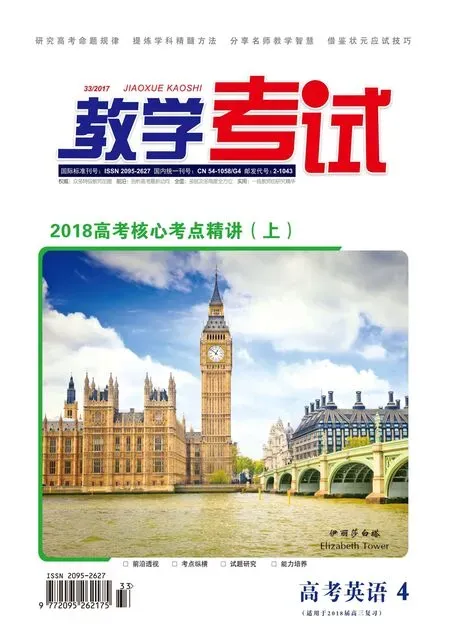委婉假设
——虚拟语气
陕西 王新仓
委婉假设
——虚拟语气
陕西 王新仓
在英语国家中,出于礼貌和委婉,人与人交流时通常使用一些“间接”表达方式,虚拟语气(Subjunctive Mood)就是其中一种比较委婉的表达方式,同时虚拟语气也是高考的主要考点之一。
近年来,各省市的高考试题中对于虚拟语气的考查主要有以下四类:
考点Ⅰ.含有条件状语从句的虚拟语气
含有条件状语从句的虚拟语气是虚拟语气最普遍的表达形式,这样的虚拟语气中主句和条件状语从句的谓语动词构成有一定的规律,其具体的表达形式分为以下四种:
1.表示与现在的事实相反的假设
与现在事实相反的虚拟语气主从句的谓语动词的构成形式是(谓语动词以do为例,下同):

_______________________________________________________________从句_主句did(be的过去式只用were)would/should/could/might + do
例如:
(1)If ___I____(be) you,I would not say those words.
2.表示与过去的事实相反的假设
与过去事实相反的虚拟语气主从句的谓语动词构成是:

________________________________________________________________从句_主句_____had_________done_would/should/could/might + have done
例如:
(2)If I________(see)it with my own eyes,I wouldn’t have believed it.
3.与将来的事实相反的假设
与将来事实相反的虚拟语气主从句的谓语动词构成是:

______________________________________________________________从句_主句did(be的过去式只用were)should+ do_________we_________________________________________re+_to_do would/should/could/might+do
注意:当含有条件状语从句的虚拟语气中省略从句引导词if时,从句用部分倒装句,即将从句谓语中的助动词、系动词或情态动词提到从句的主语之前。例如:
Had you asked me,I would have told you.
Were I in school again,I would work harder.
4.错综/混合条件句
错综/混合条件句是指主从句表示不同时间段的假设,比如从句表示与过去或现在事实相反的假设,主句表示现在或将来的情况。例如:
(3)If you________(study) hard when you were young,you________(live) a happy life now.
(4)If you_______(promise) your friend to see a movie with her,you_______(not,break) your promise this weekend.
考点Ⅱ.名词性从句中的虚拟语气
名词性从句中的虚拟语气的具体考查方向是:
一、主语从句中的虚拟语气
1. It be+形容词+that...句型中从句谓语动词用(should)+动词原形。用于该句型的形容词有:necessary,good,important,right,wrong,better,natural,proper,funny,strange,surprising等。例如:
(5)It’s natural that he_______(feel) hurt.
2. It be+过去分词+that...句型中从句谓语动词用(should)+动词原形。用于该结构中的过去分词是表示“建议、请求、命令”等词的过去分词,诸如 desired,suggested,requested,ordered, proposed等。例如:
(6)It is desired that the building of the road_______(complete) next month.
(7)It’s suggested that someone_______(take charge of) the accident.
3. It is time (about time/high time) that...结构中,从句谓语动词用过去式或should+动词原形,should不能省去。例如:
(8)It is high time I________(go) home now.
二、宾语从句中的虚拟语气
1. wish后的宾语从句中,表示与现在或将来事实相反时,从句谓语动词用过去式(be的过去式只能用were);表示与过去事实相反时,动词用had done。例如:
(9)Ellen is a fantastic dancer. I wish ___I____(dance)as well as her.
(10)I wish ___I____(be) at my sister’s wedding last Tuesday,but I was on a business trip in New York then.
2. advise,direct,agree,ask,demand,decide,desire,insist,order,prefer,propose,request,suggest等表示“建议、要求、命令、请求”等主观性动词后的宾语从句中用虚拟语气,即从句的谓语动词用should+动词原形,should可以省略。例如:
(11)I suggested we________(attend) the meeting this weekend.
(12)The doctor advised that he________(change)his job.
特例:当suggest是“暗示,表明”之意,insist是“硬是说”或坚持某种看法或主张时,或其后宾语从句谓语动词的动作或状态已经发生或存在时,宾语从句不用虚拟语气。例如:
(13)The dark cloud suggested it will be cloudy.
(14)The girl insisted that she hadn’t wasted any money.
3. would rather后的宾语从句中谓语动词用过去式表示与现在或将来事实相反,用had+过去分词表示与过去事实相反。例如:
(15)We would rather our daughter________(stay)at home with us,but it is her choice,and she is not a child any longer.
(16)I’d rather you_______(see)the film yesterday.
(17)We’d rather you_______(go) outing with us this weekend.
三、表语从句、同位语从句中的虚拟语气
表示“请求、要求、命令、建议”等意思的名词,如advice,desire,decision,idea,instruction,order,plan,proposal,recommendation,request,requirement,suggestion,wish后的表语从句和同位语从句都需用虚拟语气。其虚拟语气的结构为:(should)+动词原形。例如:
(18)We followed his advice that we_______(ask)our teacher for help.
(19)The boy told us his idea that he_______(go)to university.
(20)His suggestion is that we________(finish) the work this week.
(21)Their plan is that they________(build) a new subway in their hometown.
考点Ⅲ.状语从句中的虚拟语气
1.在 whatever,whichever,whenever,whoever,wherever,however,no matter+疑问词等引导的让步状语从句中,从句虚拟语气的结构为:
①may+动词原形(指现在或将来)。如:
(22)We will finish it on time no matter what/whatever_______(happen).
(23)We will find him wherever/no matter where he_______(be).
(24)I will wait for him no matter how late he_______(come).
②may+完成式(指过去),主句结构不限。如:
(25)You mustn’t be proud whatever / no matter what great progress you________(make).
(26)We must respect him no matter what / whatever mistakes he________(make).
2.方式状语从句中的虚拟语气
as if,as though 引导的方式状语从句常用虚拟语气,即从句谓语动词用had+过去分词表示动作发生在主句动作之前;用过去式(be的过去式只用were)表示动作与主句谓语动词动作同时进行;用would/could/might/should+原形动词表示动作发生在主句谓语动词动作之后。例如:
(27)They began to talk warmly as if they________(know)each other for long.
(28)He coughed twice as if someone_______(come).
考点Ⅳ.简单句中的虚拟语气
1. if only(要是……该多好啊)后的句子谓语动词用过去式表示动作发生在现在或将来,用had+过去分词表示动作发生在过去。例如:
(29)If only you_______(go) with us this weekend.
(30)If only I________(pass) the text last week.
2. with(有)、without(没有)、but for(要不是)等介词短语表示假设的条件时,句子谓语动词用would/should/could/might+动词原形表示现在或将来的动作,用would/should/could/might+ have done表示过去所发生的动作。例如:
(31)Without mobile phone,most young people________(not,know) how to communicate with others now.
(32)With your alarm,___I____(get) back my lost iphone.
3. 在日常的一些祝愿语中,通常用may+动词原形作谓语。例如:
May you succeed!
参考答案:(1)were;(2)hadn’t seen;(3)had studied;would live;(4)had promised;wouldn’t break;(5)(should) feel;(6)(should) be completed;(7)(should) take charge of;(8)went/(should) go;(9)danced;(10)had been;(11)(should)attend;(12)(should) change;(15)stayed;(16)had seen;(17)went;(18)(should) ask;(19)(should)go;(20)(should) finish;(21)(should)build;(22)may happen;(23)may be;(24)may come;(25)may have made;(26)may have made;(27)had known;(28)should come;(29)went;(30)had passed;(31)wouldn’t know;(32)could have gotten
陕西省宝鸡高新区教研室)

